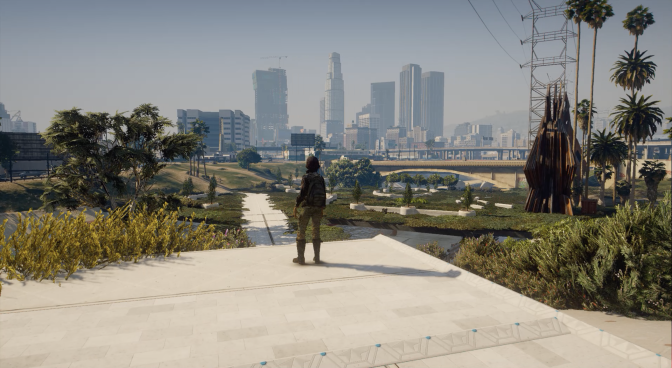A series of short films created by UCLA students over the past five years uses a “modded” version of the popular video game Grand Theft Auto V to explore Los Angeles’ ecological future.
The “Grand Theft Eco” project includes three animated episodes about environmental change and its “consequences for a major metropolis” in the year 2050, according to UCLA.
The first episode, “The iBear in the River,” was scheduled to premiere Monday in UCLA’s Kaplan Hall in Westwood, but the event has been postponed after UAW Local 4811, the union representing UC student employees and researchers, voted to authorize a strike.
Ursula Heise, a UCLA professor of English and Environmental Studies who helped lead the project, told LAist they wanted to steal the city’s future back from apocalyptic visions, and inspire young people to engage in the struggle for a better environment.
“Very rarely do you find a vision that dares to imagine that some of our environment and some of our social problems might actually improve,” she said. “So we were trying to think about how we could envision futures of Los Angeles, circa 2050, where some important strides have actually been made to make the city greener and cleaner, without at the same time denying that that's not going to solve many of the social problems that we have.”
About the project
“Grand Theft Eco” is set in a green future where major environmental problems have been addressed, like the transition to renewable energy and loss of biodiversity. But according to UCLA, social and racial inequalities remain, which complicates how the solutions are experienced.
Heise said they settled on the year 2050 because it’s far enough out that people can imagine substantial changes in society, while at the same time being somewhat limited with how far they can jump off from the present.
“I mean, if you think about 1924, people could not have imagined feminism or decolonization or the rise of computer culture,” she said.
Nearly two dozen students, both undergraduate and graduate, wrote scripts, voiced the characters, and reprogrammed the 2013 game to be the sets for their stories.
Angel Tolentino, a former UCLA student who modded the game, said in a statement that to build a better world, we must first envision one.
“I think this is a creative step in the right direction,” she added.
Each of the three episodes have their own theme that play off classic film genres.
“The iBear in the River” is a twist on the quest narrative and focuses on the revitalization of the Los Angeles River. It follows two girls, Yolanda Arellanos, a Latina from a working-class family, and Kerstin Connor, an affluent white teenager, on an adventurous chase for an electronic toy bear through the vibrant river landscape.
The second episode, called “Dark Olympics,” is inspired by film noir and highlights a private-public competition over electric power. The city is set to host the 2050 Summer Olympics — the “first solar games” — when a major blackout hits and L.A. Department of Water and Power inspector Ray Handler is tasked with investigating the cause.
The third and final episode, “Coyote Heist,” is centered on urban wildlife and is based on the heist narrative. It follows Zoë, a female coyote, who falls in love with Bowser the border collie after she strays into an unhoused encampment on the outskirts of Pasadena.
Heise noted that this episode is based on the research of a recent doctorate graduate and cinematographer who worked on the project, Chase Niesner.
“He was really interested in the way in which some of the rhetoric against coyotes rhetorically overlaps with some of the rhetoric against unhoused people in certain areas,” she said. “I thought it was a fascinating dissertation on the way in which both unhoused communities and coyotes use some of these interstitial spaces in the urban environment.”
Daniel Snelson, UCLA assistant professor in the English and Design Media Arts departments who helped lead the project, told LAist it seems like a counterintuitive choice to be using a game about theft and mayhem to tell these stories.
“But I think it's precisely in contrast to the game's storyline and the way that the game is developed that we're able to highlight the otherwise invisible infrastructures behind the game,” Snelson said. “Of course, it models Los Angeles quite accurately, but it also has a really beautiful nature preserve. It also has all these really fantastic natural elements.”
What’s next
The series is intended to be used as a teaching tool for classes at UCLA, and the team said they’ll be consulting with major networks on digital distribution opportunities.
You can learn more about the project here.
Snelson said they’re also looking at releasing some of the mods they’ve developed so other people can explore the world of Grand Theft Eco.
“For example, Frank Gehry has proposed a park that will sit atop the L.A. River, and so we actually built this in the game,” he said. “And this has been amazing for us to play with, not just to use as a cinematic device, but you can actually go into the game and play in this park as though it already exists. So we're hoping, I think, to release mods for other people to be able to play our vision of L.A.”









